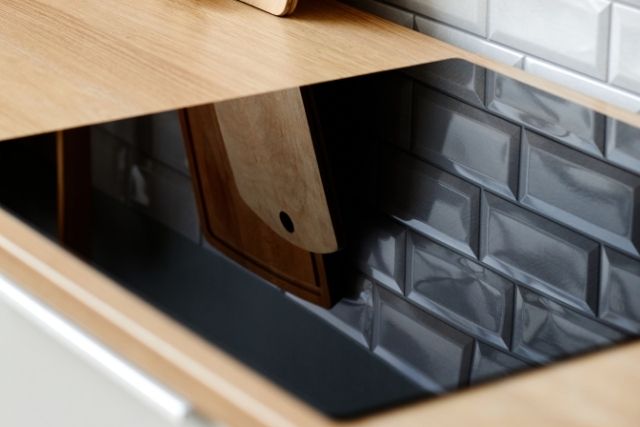How to Clean a Glass Stovetop
Learning how to clean a glass stovetop effectively is essential for anyone looking to maintain their kitchen in top condition. These easy cleaning tips will not only make your glass stovetop look brand new but also enhance its performance and safety. From frying vegetables to cooking chicken, your stovetop withstands a lot of use, which often results in oil splatters, burnt food, and other messes. Regular cleaning is crucial, and fortunately, with the right tools, keeping a glass stovetop clean is simpler than you might think.

Why It’s Important to Clean Your Glass Stovetop
Regularly cleaning your glass stovetop is crucial for keeping it looking good and working properly. Burnt food on the stovetop can create hot spots that might crack the glass.
Glass cracking isn’t the only safety issue with not maintaining your stovetop properly. Grease, food particles, and spills on a glass stovetop can become fire hazards. If these substances build up and get hot, they might catch fire.
How Often Should You Clean Your Glass Stovetop?
You should clean your glass stovetop after each use to prevent the buildup of food residues, grease, and spills. Besides daily wiping, it’s also recommended to do a thorough cleaning at least once a week. Additionally, you should clean up any spills and stains as soon as the stovetop has cooled down.
Safety Tips for Cleaning Your Stovetop
When cleaning your stovetop, you should follow some safety steps to protect yourself.
- Make sure the stovetop is off and cool before you start cleaning it. You can get burned if you touch it while it’s still hot.
- Open windows or use exhaust fans in your kitchen to help air out the area when you clean.
- Be careful not to let too much water or cleaner touch the stove’s electrical parts. Water can cause electrical issues or damage.
What You Need
Before you start cleaning, gather the following items, though you might need different materials based on the cleaning method you choose:
- Non-abrasive cleaning pad
- Microfiber cloths
- Distilled white vinegar
- Water
- Dish soap
- Commercial cleaner made for glass stovetops
How to Make and Use Your Own Cleaner for a Glass Stovetop
Cleaning a glass stovetop with a homemade cleaner involves just mixing a few everyday household items and putting them on the surface. Here are two methods to try, depending on how dirty your stovetop is.
White Vinegar and Water
- Use a non-abrasive cleaning pad to wipe off any loose debris from the stovetop.
- Mix equal parts of white vinegar and water in a spray bottle.
- Spray the mixture on the stovetop and let it sit for a few minutes to loosen the residues.
- Gently clean the surface with the non-abrasive cleaning pad.
- Wipe off the cleaning solution using a damp microfiber cloth.
- Dry the surface with another microfiber cloth.
- Repeat these steps if there are still residues or stains left.
White Vinegar and Dish Soap
Here’s a simpler way to clean your glass stovetop:
- Use a non-abrasive cleaning pad to wipe off any loose debris from the stovetop.
- In a spray bottle, mix equal parts of white vinegar and water, and add a little dish soap for tougher stains.
- Spray the mixture on the stovetop and let it sit for a few minutes to loosen the residues.
- Gently scrub the surface with the non-abrasive cleaning pad.
- Wipe off the cleaning solution with a damp cloth.
- Dry the surface with a microfiber cloth.
How to Use a Store-Bought Cleaner on Your Glass Stovetop
To clean a glass stovetop with a commercial cleaner, make sure the spray is specifically made for glass cooktops.
- Use a non-abrasive cleaning pad to wipe off any loose debris from the surface.
- Put a few drops of liquid cleaner directly on the stovetop.
- Gently scrub the surface with the non-abrasive cleaning pad.
- Remove the cleaning solution with a damp cloth.
- Dry the surface with a microfiber cloth.
How to Avoid Scratching Your Glass Stovetop
Although glass stovetops are easier to clean than other types, they can scratch easily if not handled carefully. Remember these points to avoid accidentally damaging your cooktop.
- Avoid using abrasive materials like steel wool or rough scrub brushes as they can scratch the glass surface. Instead, opt for microfiber cloths or non-abrasive sponges.
- Use cleaning products specifically made for glass stovetops. Stay away from harsh chemicals that can harm the glass or emit dangerous fumes when heated.
- Be careful not to slide rough pots and pans across your glass stovetop, as this can create micro-scratches. Over time, these scratches can build up and possibly weaken the glass, making it prone to cracking.
- Don’t drop heavy objects on your glass stovetop. While glass-ceramic stovetops are strong, they can still be damaged by heavy impacts.